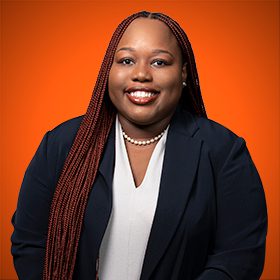Keiwana Glover is PhD Student in translational biomedical sciences at Georgia State University. She is a member of Health Policy Research Scholars Cohort 2021.
Tell us a little bit about yourself and what your research interests are.
I am a biomedical scientist with an entrepreneurial mindset. I have research experience in a diverse array of topics including cancer, diabetes, glaucoma, and STDs. After receiving my MS in biomedical research, I worked as a project manager for a clinical research organization and as a Director of Research and Assay Development, which motivated me to get my PhD in translational biomedical sciences. My ultimate goal is to create a research company that works to find cures for diseases that disproportionately affect communities with fewer resources.
What’s the story behind why you’re doing what you’re doing?
My maternal grandfather, Henry Boykins, spent his life creating, drawing, and designing engines. He completely lost his eyesight due to diabetic retinopathy, an autoimmune disease he developed due to uncontrolled blood glucose levels. Mortified for him, I wanted to know why this happened to him and why it seemed he did not get the same amount of care as others. It is my life’s mission to find a cure for type 2 diabetes, implement policies to provide affordable insulin and other diabetes drugs, as well as help bring access to quality healthcare to at risk and underserved populations affected by type 2 diabetes.
Tell us about a project you are currently working on that you are excited about.
I am currently working on antibiotic resistance in Neisseria gonorrhoeae, which causes the sexually transmitted disease gonorrhea. Neisseria gonorrhoeae rapidly develops resistance to antibiotics. Therefore, gonorrhea may soon become untreatable if new antibiotics and diagnostic tools are not developed. My project is exciting because it will contribute to research that will be beneficial to the public health community by helping doctors treat this infection.
For people unfamiliar with your research area, what is one piece of information you think is important for them to know?
As biomedical scientists, we often get so focused in our research area or a particular project that we do not see it come to fruition on a large scale until many years later. Science takes time and patience, but the long term rewards are worth it. I want to encourage young scientists to follow their curiosity and passion even when they think there is a dead end, it is often just a redirection. Follow the data.
Who is a researcher you admire and why?
Kizzmekia Corbett is an African-American viral immunologist that uses her expertise to propel novel vaccine development for pandemic preparedness. She was especially key in creating the Moderna vaccine against COVID-19. I admire her not only as an amazing scientist but because she has taken on a prominent role as a vaccine educator, reaching out especially to communities of color, which have been disproportionately impacted by COVID-19 and have long suffered from healthcare disparities.
How do you think HPRS will complement your doctoral training?
My participation in the Health Policy Research Scholars Program will help me to successfully influence public health professionals to advocate for minority populations who often suffer from diseases such as type 2 diabetes due to a lack of access to healthier foods, inefficient health literacy, and inadequate healthcare. The core of my goal as a doctoral student aligns perfectly with the Program’s focus on building a Culture of Health to catalyze a larger national movement toward real societal transformation. Although my efforts in research will not be the only catalyst of change, it will be a piece of the puzzle that brings equity to our healthcare system. Additionally, HPRS will give me the support I need to get through my doctoral program, as well as the tools to be successful in translating my research into public health.
What part(s) of HPRS excite you the most?
In addition to learning how to write and implement public health policies, the most exciting part about HPRS is the network, mentors and leaders that have taken the time to support me above and beyond. I am so grateful for the mentorship I have received thus far and intend to pay it forward. Without this village, I would not be as successful in my doctoral program.
In the RWJF HPRS program we will work with you to help you think further about using your research to develop policy. If you could use your research to change any policy, what policy would it be?
If I could use my research to change any policy it would be to change the Affordable Insulin Now Act to provide affordable insulin and other diabetes drugs to people that have type 1 or type 2 diabetes. Americans who depend on life-saving insulin everyday should not be forced to choose between buying groceries or buying insulin.
Here’s a fun question to wrap things up. If you had a talk show, who would your first three guests be?
If I had a talk show, my first three guest would be Michelle Obama, Kizzmekia Corbett, and Tabitha Brown.

